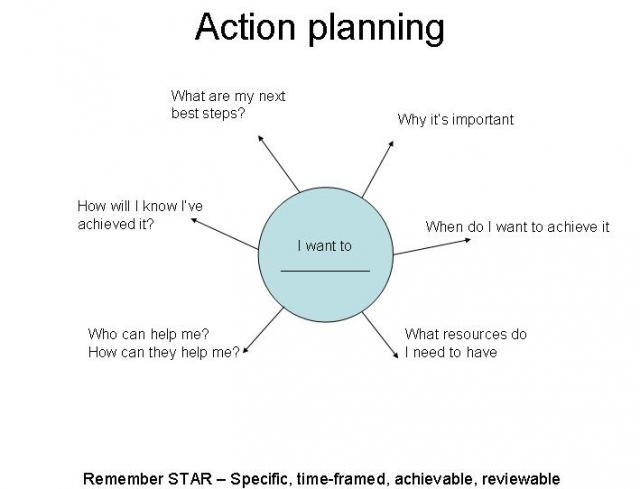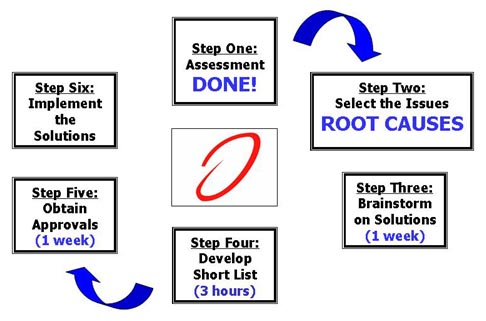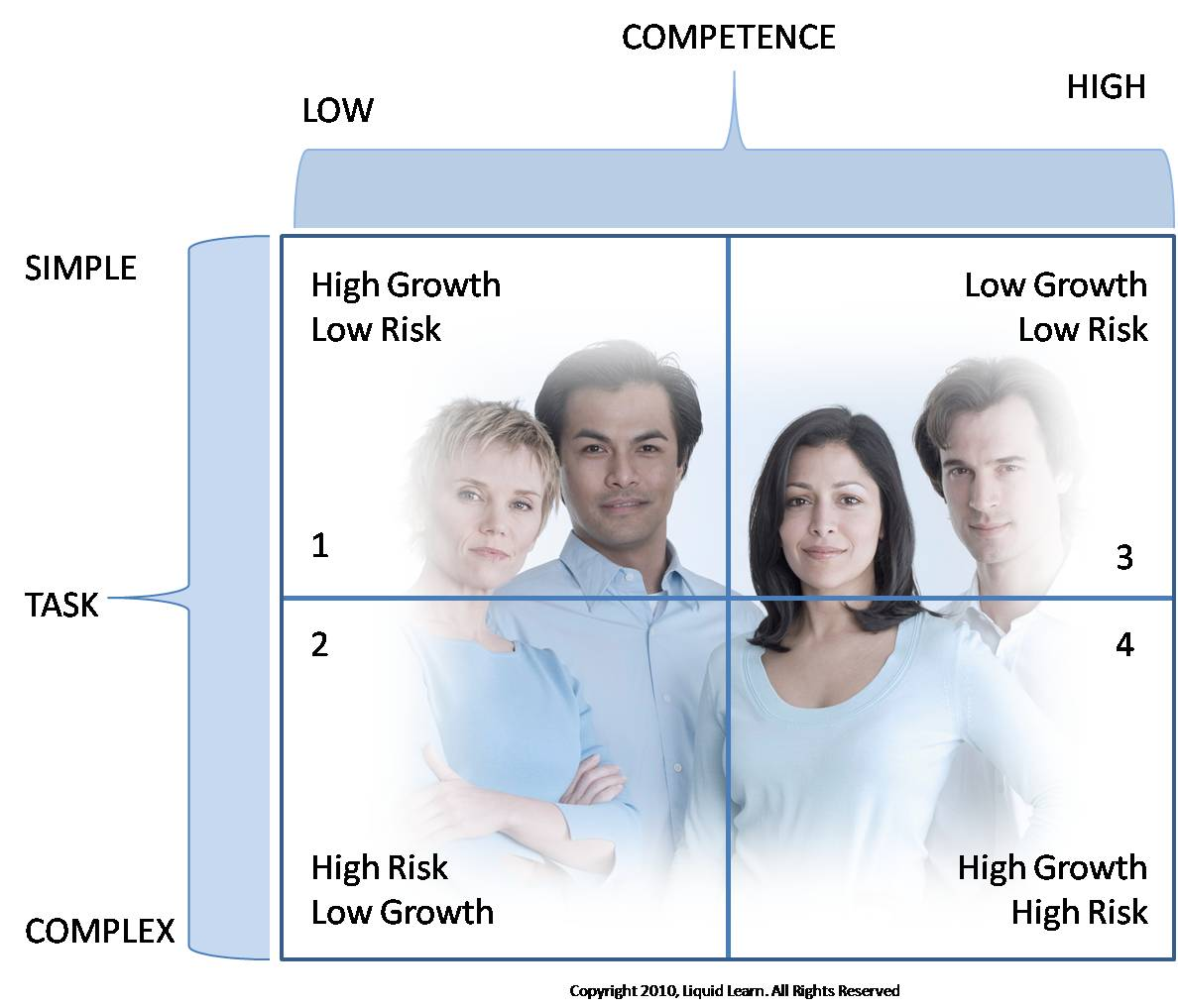Book
by
arrange a day shadowing the work of a Easter
favourite
graduate in the Career that seems to be most of vacation author
interest.
Step 5. I will see my careers adviser to discuss
Meal
out
By 10th
the ideas I have got from the above and to
with
May
narrow these down.
friends
What problems am I likely to face? What will I do to overcome these?
Fear of life after university. Have procrastinated too long and now
realise that I must take action or miss opportunities.
Will I be able to arrange a suitable work-shadow? If nobody suitable in
the Careers Network, may have to contact companies directly for help.
© copyright of the University of Kent Careers Advisory Service
1252


Source: http://healthskills.wordpress.com/
1253
4.24 THE POWER OF GOOD HABITS
There are many documented reasons why people fail to achieve their full
potential.
As noted earlier, the top three percent of the population are disciplined
goal setters. What is interesting is that the next 27% only need to put in
a small effort to move into the top group.
The secret behind the effort is the development of habits and strategies,
which support the achievement of clear goals.
Benjamin Franklin discovered this the hard way. He was receiving
constant criticism about his negative communication. He listed all the
elements in his life that he had the courage to say did not support him or
his relationships. He worked on one of these elements each month. He
had set goals to develop new successful habits.
Look at the list on the next page. What habits do you need to change in
order to achieve the success you deserve? These habits and strategies
are the basis of success in life. People who make a conscious effort to
include these in their lives get positive results.
What are you going to do about the habits and strategies you are not yet
able to tick? the Complete Goal Management System suggests that, if
there are some unchecked questions, then they need to be included in
your Overall Strategies. If you have specific strategies that are uniquely
necessary for a specialist role, you will need to add them later. For
example, an athlete may have to attend the gym every day for an hour, a
doctor may have to read a journal article every day.
Keep referring to these questions as a monthly check, and aim to have all
strategies a part of your goals plan. Remember ... it takes courage to
accept the truth. Successful people form habits to do the things that less
successful people don't like to do.
1254
Look through the following questions about useful habits and overall
strategies and tick those that apply to you right now.
I have a clear sense of purpose or direction for my life.
I am able to stay focused and concentrate my efforts onto one definite
aim.
I am usually able to make decisions and work consistently on them.
I am willing to take a chance on a positive outcome¾even if it is
risky.
I am willing to do whatever it takes, rather than look for something
for nothing.
I control my negative thoughts.
I practice habits, which contribute, to my good health including a
nutritious moderate diet, regular exercise and meditation or yoga-
type relaxation.
I tackle tasks immediately rather than putting them off and
procrastinating.
I persist in the face of difficulty. When the going gets tough, many
people give up.
I am willing to aim high. Many people put up with average goals and
mediocre performance.
I seek out and surround myself with people who encourage and
coach me to great success. Too many people listen to those who say,
“you can't”.
I am willing to learn, read and acquire the knowledge and skills to
become a generalist, able to adapt to and succeed in almost any
environment. Contrary to popular beliefs, people who become too
specialized become white elephants who cannot keep up with the
speed of changes in society.
I am enthusiastic, committed and motivated.
I am pro-active ¾I make things happen in my life. Victims wait for
things to happen to them.
I have clear roles in life and act in balance across work, home, self
and community.
There is a critical incubation period of about 30 days, when you first
apply new ideas. With the passage of time, the action becomes habitual.
A successful coach knows the importance of developing positive habits.
1255
Consider this:
Who Am I?
You may know me :
I'm your constant companion
I'm your greatest helper; I'm your heaviest burden
I will push you onward or drag you down to failure
I am at your command
Half the tasks you do might as well be turned over to me. I'm able to do
them quickly and I'm able to do them the same every time if that's what
you want.
I'm easily managed, all you've got to do is be firm with me.
Show me exactly how you want it done, after a few lessons I'll do it
automatically.
I am the servant of all great men and women, of course, servant of the
failures as well.
I've made all the great men who have ever been great. And, I've made all
the failures, too.
But I work with all the precision of a marvellous computer, with the
intelligence of a human being.
You may run me for profit or you may run me to ruin, it makes no
difference to me.
Take me. Be firm with me and I'll put the world at your feet.
Be easy with me and I will destroy you.
Who am I?
I am habit!
“Success is a matter of understanding and religiously practicing specific,
simple habits that always lead to success.” *Robert J. Ringer*
1256

First forget inspiration. Habit is more dependable. Habit will sustain you
whether you’re inspired or not…Habit is persistence in practice.
*Octavia Butler*
“Bad habits are like a comfortable bed, easy to get into, but hard to get
out of.” *Proverb*
“The more severe the pain or illness, the more sever will be the
necessary changes. These may involve breaking bad habits, or acquiring
some new and better ones.” *Peter McWilliams*
“The thought manifests as the word The word manifests as the deed The
deed develops into habit And habit hardens into character. So watch the
thought and its ways with care, And let it spring from love born out of
concern for all beings.” *The Buddha*
“Winning is not a sometime thing it’s an all time thing. You don’t win
once in a while, you don’t do things right once in a while, you do them
right all the time. Winning is habit. Unfortunately, so is losing.” *Vince
Lombardi*
Habit is either the best of servants or the worst of masters. *Nathaniel
Emmons*
Source: Achieve Your GOALS - The Complete Goal Management System -
INFORMATION AND EDUCATION SERVICES
www.thepdi.com - www.thepdi.com/donaldcarty
© Copyright 2005 Personal Development Institute Atlanta, Georgia
30518, USA
1257
4.25 THE ART OF DELEGATION
Educating your clients in mastering the art of delegation, is an invaluable
coaching skill.
Your ability to explain and coach your clients to implement the idea that
they don't have to do everything themselves will have a huge impact on
their business and personal life.
So let's examine the subject in more detail:
What tasks should be considered for delegation?
Powerful Tips for Mastering Delegation
More Important Steps of the Delegation Process
Overwhelm, having too much to do and not enough time, is often one of
the biggest issues coaching clients bring to the table in both personal and
work issues.
But the answer is not just about getting someone else to do things for
you.
The art of delegation is about managing the process elegantly and
smoothly.
Before we get onto the tips, I’d like to share the three big mistakes I find
people make when they start to delegate.
Three Delegation Mistakes
1. Abdication: The first is “delegation by abdication”. That is, just tell a
subordinate, or whoever, to just get on with the job without giving
them proper instructions or a context for what they have to do and
by when. And then carpeting them when they don’t get it right!
2. Too much information! Of course instructions need to be given but
the second mistake, I believe, is giving them too much instruction as
to exactly approach the task. That is insisting they do it your way
rather than the way that is going to work best for them. In this
context, you might find it useful to read how I use the Kolbe™ Index
in helping clients understand how best they and their staff operate.
And there are many other profiling tools that are useful in this
regard.
1258
3. No Acknowledgement: And finally, a huge mistake is not to
acknowledge the delegatee sufficiently when the project is
completed, or even give praise along the way.
Acknowledgment is so important to people and I find disappointment
and frustration at work is often because many executives and CEO’s
fail to give their staff enough positive encouragement and feedback.
Read more about the motivating power of acknowledgement in my
recent Coach the Coach tip.
So there are my pet delegations mistakes. Now let’s get positive and look
at how to educate your clients on the art of delegation; what they should
aim to delegate, the steps of delegation and some useful delegation tips.
What should be considered for delegation?
Tasks that consume your time but are not necessarily the best use of
your time
Things you are not particularly good at, or don’t like doing and
someone else could do better. For instance if you are hopeless at
proof reading, get bored and can’t trust yourself to get it right.
Is this the best use of my time? A good way to hone in on this is to keep a
diary of everything you do throughout the day and keep asking yourself
“Is this the best use of my time?” or “Could somebody else be doing
this?”. This is particularly important if you have challenges with time
management at work.
The aim is to delegate but keep control.
1259
10 Tips for Mastering the Art of delegation
1. Understanding: Make sure those you are delegating to have a clear
understanding of the task required, the outcome and by when it is to
be completed. Make them feel an important part of the project.
2. Specificity: Be specific about what guidelines must be followed
(company policy etc) and where can the 'delagatee' use their own
initiative and method to reach the outcome.
3. Resources: Give information on where to find resources available to
help them with the task. Advise what is available and what may be
needed.
4. Reporting: Initiate a time-line for them to report back to you on
progress.
5. Big Picture:Make sure the delegatee knows the place the task has in
the overall project and what the positive outcome of their completion
of the task is.
6. Let Go! Once you have delegated and set up a framework for
reporting, let them get on with it and get out of the way.
7. More let go: Where possible, avoid delegating methods (we all have
our own best way of doing things), rather concentrate on results.
8. Be Available: Be available and approachable for help if needed but
avoid being too intrusive so they feel you don't trust them.
9. Encourage them to think for themselves! Have a policy that before
they come to you for help, they have thought up some possible
solution/s themselves. Avoid poo pooing those solutions, however
untenable, rather acknowledge and add your opinion and expertise
to theirs.
10. Be realistic: Where relevant, ask the delegatee how long they think
they need to complete the job. Encourage them to be realistic and not
over-promise.
1260

And finally, make you delegatees accountable. Part of the art of
delegation and your personal time management at work and at home is
encouraging your staff/team/family to be more responsible and
accountable. Make them feel good about helping you and contributing to
the overall big picture.
Ask them what they think they could help you with?
More Steps of Delegation
Make a list of all possible activities or projects you might consider
delegating be it an ongoing delegation or a specific project. (Anything
from coffee making to event management for instance)
Don’t censor yourself; you can always change your mind as you work
through the list (but please don’t decide you really can still do it all
yourself☺).
Autonomy/authority of the person (do others need to be made aware
of this).
Organize feedback meetings for long or complex jobs.
Source: Weny Buckingham: http://www.all-about-becoming-a-life-
coach.com/art-of-delegation.html#ixzz1qnFm8uod
Managing The Risk of Delegation
1261

Delegation can be one of the most crippling
tasks for a new manager. New managers
often cling to their workload as if it were
their first born child, or any child for that
matter. They protect and hide these
proverbial children as if protecting them
from the evils of the world. They fear that it
can never be done as good as they do it.
Therefore their misplaced pride leaves a
disengaged workforce on the sidelines.
Delegation doesn’t have to be painful. In fact any seasoned manager will
praise this strategy as necessary. An avoidance of delegation is a rookie
mistake when managing. This blog post is one of two designed to help
you overcome that hurdle.
The new manager has probably heard it a million times. Delegation is
necessary. Those that do it reap rewards that help them get results and
probably help them end their day at a decent hour. The first step to
convince those struggling with delegation is to sell you the benefits of
this essential strategy.
Delegation is a tool that helps your team to grow. As a manager
one of your roles is undoubtedly to develop your staff.
Delegation helps you achieve that.
Delegation gives you the opportunity to discover a new and
perhaps more effective and efficient way of doing something.
Delegation optimizes the workday. YOU CAN’T DO IT ALL
YOURSELF!
Delegation is a clear demonstration of Trust. It is difficult to
build a relationship with your team without it.
Delegation builds team cohesion and expands everyone’s
understanding of their business.
Delegation saves time.
Hopefully, those reasons resonate for you if you haven’t already
aggressively started a delegation campaign. That’s the WIIFM (What’s In
It For Me). Usually managers, new and old understand they should be
1262

delegating but there’s an obstacle that they can’t get around. This
manager will make excuses like the following:
No one can do it better than me
I don’t have time to train someone to do it
I’ll just have to do it over myself
My team is already over tasked
I don’t have anyone on my team who can handle this task
If any of those statements have crossed your lips, this post couldn’t come
any sooner. It’s time for you to release your fears. Fear will destroy your
ability as a manager. Your success is dependent on using the strategy of
delegation. In the next post we’ll review a tool to help you start your
delegation strategy.
You realize the benefits and the need for
every manager to use a delegation
strategy. First steps can be scary. Perhaps
an absence of delegation has gotten you to
this point. It’s difficult to adjust and change
when your experience is telling you
otherwise. One of the biggest obstacles to
trying something new is having a plan to
do it. Simply convincing you of the power
of delegation is hardly enough to make the
transition easy from the way you managed
in the past to this foreign style of management that you are not
accustomed. The Delegation Risk tool is designed to help you put your
strategy in perspective and protect those concerns you have that prevent
you from managing through delegation.
The Delegation Risk tool (DRT) is a way for you to assess the level of risk
in a decision to delegate a task. Using the tool will provide you with
perspective and peace of mind. Figure 1 is the Delegation Risk tool. The
tools should be applied separately for each of three categories.
Cognitive
Technical
Interpersonal
1263

Combination
The Cognitive Category is for those tasks that challenge problem solving
skills. The Technical Category is for those tasks that challenge the ability
to conduct a task. The Interpersonal Category is for those tasks that
challenge the ability to work with other people in a team or group
setting. Finally, the Combination Category is for those tasks that are
complex and involve a combination of 2 or more skills of the other
categories. The delegate (the employee you are delegating to) must have
a competence appropriate for each category to minimize risk.
There are two scales in the DRT. The first scale is the competence level of
each of your employees. This is an individual assessment, not a group
assessment. The second scale is your assessment of the difficulty of the
task. These two measurements intersect to create 4 quadrants that help
1264
us to define the level or risk and growth potential (for the delegate) a
decision to delegate will have on your goals.
The first scale is the employee’s competence level. Each of your
employees will have a unique position on this scale. It’s clear everyone
has unique talents and developmental needs. We all have both.
Competence is measured from low to high. Low competence is an
employee who has limited to no cognitive, technical or interpersonal
competence. High competence is an employee who has exceptional
cognitive, technical or interpersonal competence. Once you identify the
placement of the employee on this scale, it is time to analyze the task.
The second scale measures the difficulty in completing the task. Like the
first scale, every task is unique as well. When using this tool, you are not
measuring the risk of all your tasks against all your employees. Instead
you are measuring each task uniquely with each employee. The task
difficulty is measured from simple to complex. A simple task is one that
involves very little training and few steps. These tasks are usually linear.
That is the steps are sequential and involve little to no deviance from the
standard. A complex task may involve in depth training and multiple
steps. These tasks may be non-linear. That is there may be a need to
make decisions. Once you identify the placement of the task difficulty,
you can cross reference the two positions to determine the risk
quadrant.
The risk quadrant is not a warning to avoid delegating. It is a warning
that you have to put parameters into your strategy to ensure the
delegate is successful. There are four quadrants that classify the risk and
growth potential of a decision to delegate.
Quadrant 1 – Low Risk / High Growth
Quadrant 2 – High Risk / Low Growth
Quadrant 3 – Low Risk / Low Growth
Quadrant 4 – High Risk / High Growth
Quadrant 1 is for low to moderate competence delegates and the task is
simple. Growth is high because the assignment is manageable for them
yet is unique to their routine. It creates an opportunity for this employee
to grow towards the High Competence end of the scale. Quadrant one
also prepares this employee for more complex tasks in the future. The
1265
risk is low because these tasks are within the ability range of the
delegate.
Quadrant 2 is for low to moderate competence delegates and the task is
complex. Growth is low because the assignment will likely encourage
failure and discouragement. Delegates will rarely move from the low end
of the competence scale when assigned to this quadrant. The risk is high
because these tasks are outside of the ability range of the delegate.
Quadrant 3 is for high competence delegates and the task is simple.
Growth is low because the assignment is well below their abilities. The
task may even seem trivial and busy work to them. These tasks may de-
motivate your high competence delegates. The risk level is low because
the task falls well within or below their level of ability. There is very little
challenge in the task.
Quadrant 4 is for high competence delegates and the task is simple.
Growth is high because the task is challenging and stimulates the use of
complex skills. The delegate often learns and this typically has a
strengthening effect on their competence. The risk level is high. The task
is complex and if new to the delegate, they may still need guidance.
Complex tasks often come with high risk le










